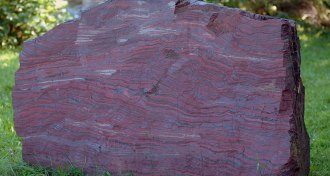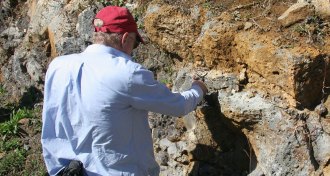Earth
Sign up for our newsletter
We summarize the week's scientific breakthroughs every Thursday.
-
 Climate
ClimateHot nests, not vanishing males, are bigger sea turtle threat
Climate change overheating sea turtle nestlings may be a greater danger than temperature-induced shifts in their sex ratios.
By Susan Milius -
 Earth
EarthOxygen flooded Earth’s atmosphere earlier than thought
The Great Oxidation Event that enabled the eventual evolution of complex life began 100 million years earlier than once thought, new dating of South African rock suggests.
-
 Anthropology
AnthropologyDNA points to millennia of stability in East Asian hunter-fisher population
Ancient hunter-gatherers in East Asia are remarkably similar, genetically, to modern people living in the area. Unlike what happened in Western Europe, this region might not have seen waves of farmers take over.
By Meghan Rosen -
 Genetics
GeneticsCRISPR used in cows to help fight tuberculosis
Chinese researchers used a CRISPR/Cas 9 gene editor to make cows more resistant to tuberculosis.
-
 Genetics
GeneticsCRISPR used in cows to help fight tuberculosis
Chinese researchers used a CRISPR/Cas 9 gene editor to make cows more resistant to tuberculosis.
-
 Oceans
OceansCone snails wander in circles, lose focus with boosted CO2
Deadly cone snails wander in circles and become less capable hunters when exposed to higher levels of carbon dioxide in seawater.
-
 Oceans
OceansCone snails wander in circles, lose focus with boosted CO2
Deadly cone snails wander in circles and become less capable hunters when exposed to higher levels of carbon dioxide in seawater.
-
 Earth
Earth3-billion-year-old crystals hint at lost continent’s fate
Zircon crystals from a long-gone continent called Mauritia may have resurfaced during volcanic eruptions on the island of Mauritius in the Indian Ocean.
-
 Oceans
OceansClimate change may boost toxic mercury levels in sea life
Increased runoff to the ocean due to climate change could raise neurotoxic mercury in coastal sea life by disrupting the base of the food web.
-
 Plants
PlantsBig genetics study blazes path for bringing back tomato flavor
Combining taste tests with genetics suggests what makes heirloom varieties tastier than mass-market tomatoes.
By Susan Milius -
 Earth
EarthDevastation detectives try to solve dinosaur disappearance
Dinosaurs and others faced massive losses 66 million years ago from an asteroid impact, volcanic eruptions or maybe a mix of the two.
-
 Environment
EnvironmentHumans’ stuff vastly outweighs humans
The human-made technosphere weighs 30 trillion tons and surpasses the natural biosphere in mass and diversity, researchers estimate.